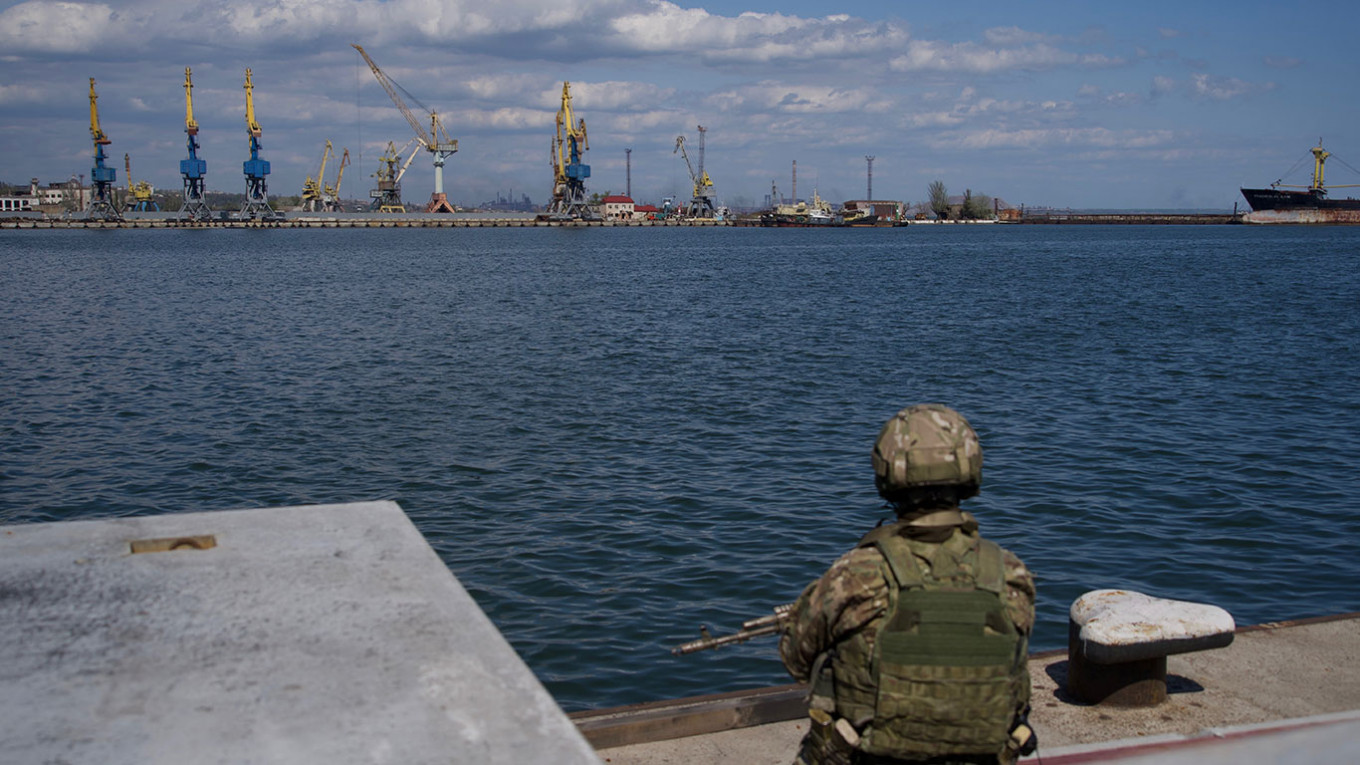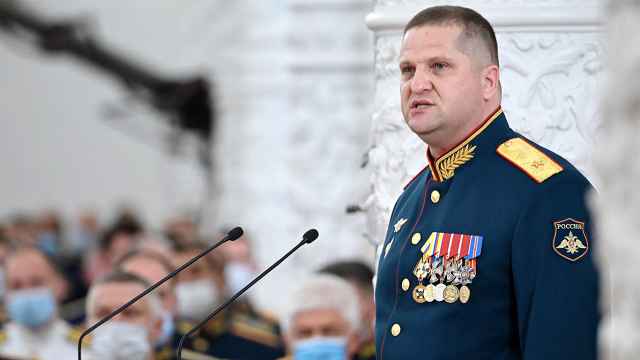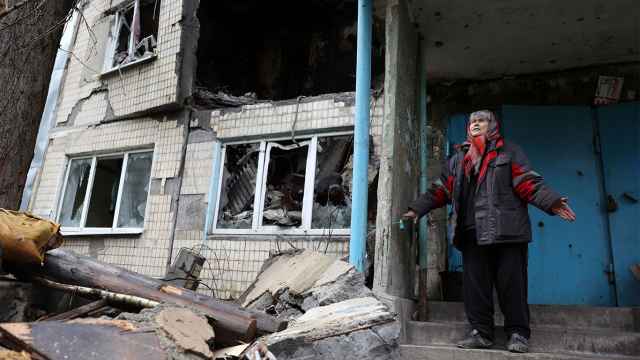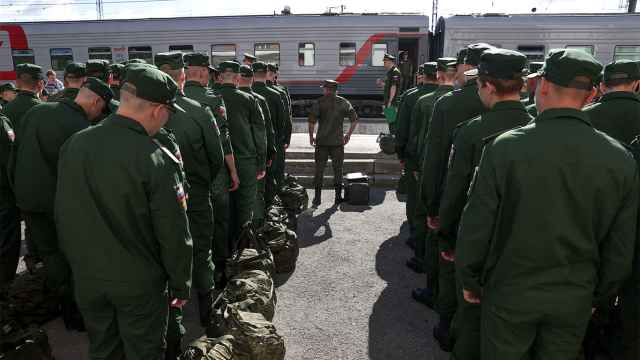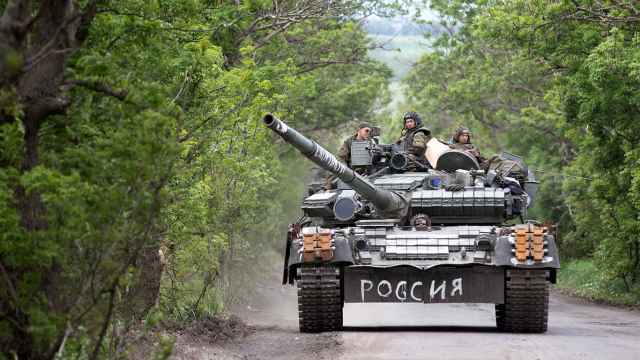In a ceremony deserving of his rank, Russian Major General Vladimir Frolov was laid to rest in St. Petersburg’s Serafimovskoe Cemetery, where tens of thousands of victims of World War II are buried.
“Today we say goodbye to a true hero. Vladimir Petrovich Frolov died a heroic death in battle with Ukrainian nationalists. He sacrificed his life so that children, women and the elderly in the Donbas would no longer have to hear the explosions of bombs,” St. Petersburg Governor Alexander Beglov told attendees at the funeral last month.
Photos later showed Frolov’s grave piled high with roses and carnations.
It was the second time in less than a week that Beglov was obliged to pay his respects to a high-ranking Russian officer killed in Ukraine.
Just four days later, Lieutenant Colonel Miras Basakov was laid to rest in Russia’s second-largest city.
A startling number of senior Russian officers are reported to have perished since President Vladimir Putin ordered Russia’s invasion of Ukraine on Feb. 24.
Analysts who spoke to The Moscow Times said the rate of attrition has reduced Russia’s capacity to plan and execute military operations and delivered a blow to morale on the frontline.
“Every death of a general makes the Russian Armed Forces less effective,” independent military analyst Pavel Luzhin told The Moscow Times.
Frolov is one of a total of 12 Russian generals to be killed in Ukraine in just over two months of fighting, according to a report Thursday by The New York Times. That is twice the number of generals killed in the Soviet Union’s 10-year military campaign in Afghanistan.
It usually takes over 15 years of service in the military to be made a general – a designation that encompasses the five highest ranks in the Russian army – and those holding the rank can be in charge of tens of thousands of men.
Other Russian losses include Major General Andrei Sukhovetsky, whose death was reported by Russian media last month, and two lieutenant generals – Yakov Rezantsev and Andrei Mordvichev – who Ukrainian officials claimed to have killed in attacks on the Chornobaivka airbase near the Russian-occupied city of Kherson.
Moscow has disputed some of these claims, with Russian state-owned Channel One calling reports of Mordvichev’s death “another fake” and broadcasting a meeting between Mordvichev and Chechen leader Ramzan Kadyrov in the besieged port city of Mariupol.
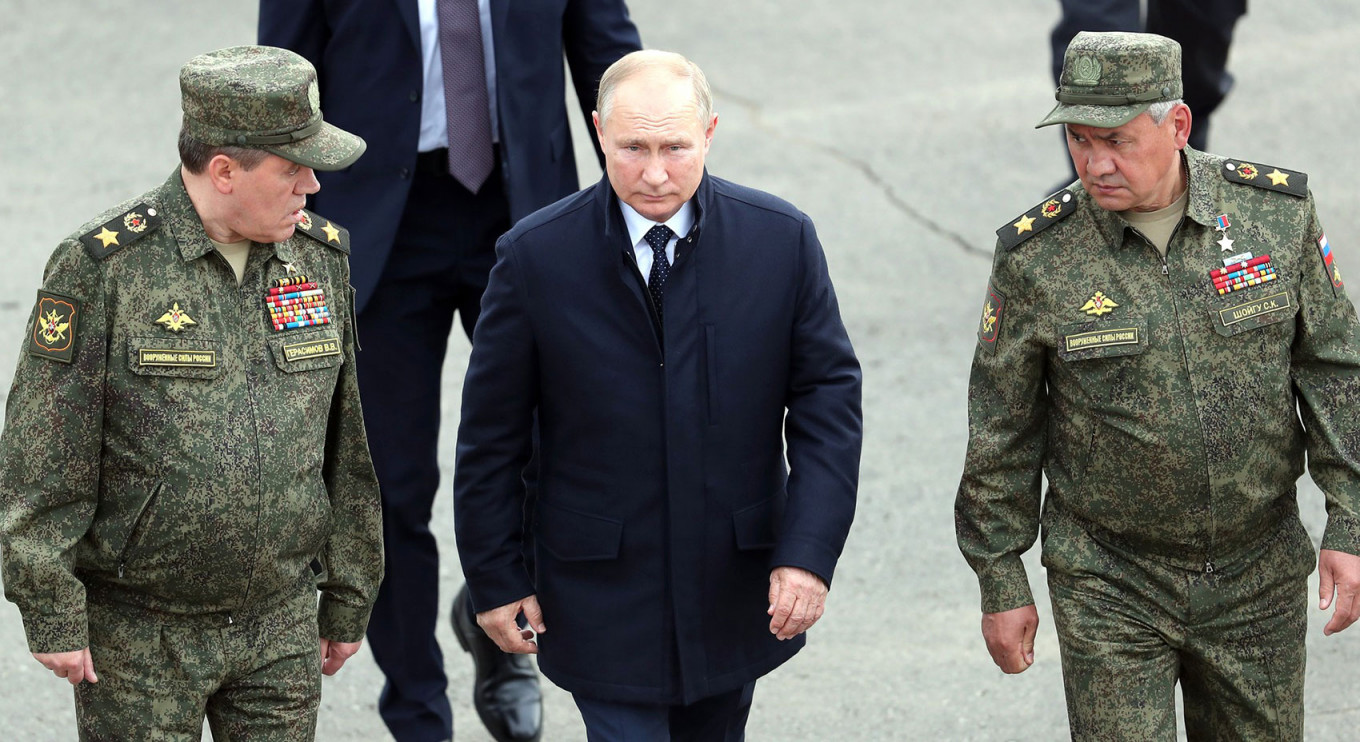
Whatever the real death toll, any casualties among Russia’s top brass in wartime have the potential to cause disruption to management of the fighting, according to analysts.
The consequences for the Kremlin could be even more serious as Russia appears to be struggling to make any serious advances in eastern Ukraine following an apparently bungled attempt to seize the Ukrainian capital.
“It can take days or even weeks to replace them,” said Luzhin of what happens when a general is killed, with new commanders needing to be readied for the front lines, establish relations with subordinates and understand the details of the military situation.
Western officials on Tuesday described Russia’s fighting in Ukraine as “cautious” and “uneven.”
One of the reasons for the higher death toll is that Russian officers are obliged to make more frequent trips to the frontlines than their Western counterparts, according to experts.
“If he doesn't get information, and officers are not feeding back information, this draws generals closer to the fighting,” said Sam Cranny-Evans, a military analyst at the Royal United Services Institute, a British think tank.
“Some generals will be friends of Putin, or associates of [Defense Minister Sergei] Shoigu and [army chief Valery] Gerasimov, to a degree in which generals in Western armies are not, so there’ll be a personal responsibility to check everything is going well,” he said.
Gerasimov, Russia’s chief of the general staff and the third-highest ranking officer in the Russian military, came close to being killed in a Ukrainian attack during just such a fact-finding mission to the strategic Ukrainian city of Izyum last weekend, according to U.S. and Ukrainian officials.
Locating Russian generals to conduct such strikes has allegedly been aided by Western intelligence fed to Ukrainian forces, The New York Times reported Thursday.
Major General Andrei Simonov, 55, a commander in charge of electronic warfare units, was one of those killed by Ukrainian artillery in Izyum, according to Oleksei Arestovych, a military advisor to Ukrainian President Volodomyr Zelensky.
Generals usually don’t die alone, according to Luzhin, and the collateral damage from attacks on command points are also often serious. “They work together with their colonels and majors. So if a general dies, it usually means colonels and officers also die.”
At least 317 Russian officers have been killed in Ukraine, a third of whom are senior staff — namely majors, lieutenant colonels and colonels, independent Russian media outlet Mediazona reported last month, citing publicly available data and media reports on Russian casualties in Ukraine.
The loss of so many senior figures not only causes short-term disruption, but impacts the Russian military’s operational capability as a whole, according to Cranny-Evans.
“Some senior Russian officers could have fought in Afghanistan, Chechnya twice, Georgia, Syria, Ukraine,” said Cranny-Evans, listing the major wars involving Russian and Soviet forces over the last 30 years.
For example, Major General Vitaly Gerasimov, whose death was reported in March by investigative outlet Bellingcat, had served in the Second Chechen War, in Russia’s military intervention in Syria, and as part of the forces that seized Crimea from Ukraine in 2014. He is unrelated to Valery Gerasimov, the head of the Russian Armed Forces.
If Ukraine is able to continue killing Russian generals at the current rate, it could soon mean a lack of knowledge and expertise at the top of the military chain of command.
“There is the scope for a loss of an enormous amount of experience,” Cranny-Evans said. “These losses will be worrying from a Russian perspective.”
A Message from The Moscow Times:
Dear readers,
We are facing unprecedented challenges. Russia's Prosecutor General's Office has designated The Moscow Times as an "undesirable" organization, criminalizing our work and putting our staff at risk of prosecution. This follows our earlier unjust labeling as a "foreign agent."
These actions are direct attempts to silence independent journalism in Russia. The authorities claim our work "discredits the decisions of the Russian leadership." We see things differently: we strive to provide accurate, unbiased reporting on Russia.
We, the journalists of The Moscow Times, refuse to be silenced. But to continue our work, we need your help.
Your support, no matter how small, makes a world of difference. If you can, please support us monthly starting from just $2. It's quick to set up, and every contribution makes a significant impact.
By supporting The Moscow Times, you're defending open, independent journalism in the face of repression. Thank you for standing with us.
Remind me later.



